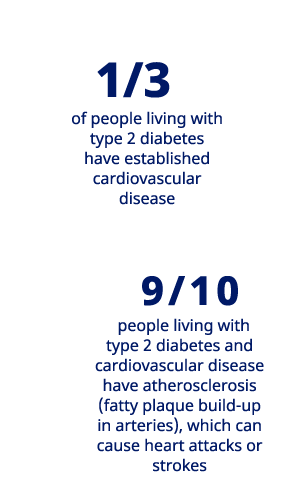
Type 2 diabetes – what’s going on in your body?
It is important to recognize the first signs of diabetes in order to get help from a doctor and managing your diabetes early on.
It is important to recognise the early signs of diabetes so that you can speak to a doctor and take steps to help manage your blood sugar levels early on. Delays in treatment may lead to worsening of the disease and some complications.3
The signs and symptoms of diabetes depend on the type of diabetes. Symptoms may appear suddenly (as in type 1 diabetes) or gradually over a period of time (as in type 2 diabetes). Complications may also arise later in life, without any evident symptoms.1,2
While type 1 and type 2 diabetes differ in their speed of onset and age, their symptoms are very similar, which include2:
During pregnancy, any woman can develop high blood sugar, which disappears after birth. This is known as gestational diabetes (or hyperglycaemia at pregnancy). 2,4
Approximately 1.2 million children and adolescents around the world live with type 1 diabetes. Additionally, type 2 diabetes in children and adolescents is on the rise. Children tend to develop symptoms quicker and more aggressively than adults.3, 5

People with type 2 diabetes are 2-4 times more likely to have a heart attack or stroke compared to someone living without diabetes.13,14
Learn how you can reduce the risk.
If you exhibit any symptoms of diabetes, you should speak to your doctor as soon as possible.
Diabetes can be diagnosed by several kinds of tests, which will be recommended by a healthcare professional. Most often for type 1 and type 2 diabetes, a fasting plasma glucose test or an HbA1C test are used, but sometimes a random plasma glucose test may also be recommended.
These tests are blood tests that measure your blood glucose levels before and after meals, or at any given time of the day to check whether they are above the recommended threshold levels.3
Gestational diabetes is screened for in the second or third trimester of pregnancy (six to nine months) by an oral glucose tolerance test. 7
A diabetes diagnosis can be quite overwhelming in the beginning but there are many ways to help manage the condition.
To learn more about life after your diabetes diagnosis, read Living with diabetes.
With the support of your family, friends and medical team, managing your condition can become part of everyday life. Motivation to manage your condition, education and technology can also assist this process.
A balanced diet, regular exercise and blood tests will help you to control your blood sugar levels. You can also monitor your blood glucose levels at home using a blood glucose meter or a continuous glucose monitor. Speak to your doctor about these meters and what you should expect when you monitor blood glucose at home. 1
If you have been diagnosed with diabetes, you also have to look out for symptoms of hyperglycaemia (high blood sugar) and hypoglycaemia (low blood sugar).
You will be able to detect hyperglycaemia in your blood sugar monitor if you use one. 9
If you are taking insulin to control your blood glucose levels, there is a chance that you may be affected by hypoglycaemia (also known as a ‘hypo’). Hypos can be dangerous and need immediate medical attention. 10
HQ22DI00077
